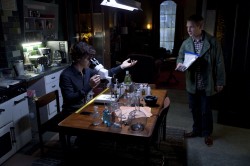 It’s been well over a year since Gatiss and Moffat’s Sherlock, a modern-day adaptation of the classic stories by Sir Arthur Conan Doyle, first graced our tv screens and since we last saw Sherlock and Watson in a potentially deadly standoff with criminal mastermind Moriarty.
It’s been well over a year since Gatiss and Moffat’s Sherlock, a modern-day adaptation of the classic stories by Sir Arthur Conan Doyle, first graced our tv screens and since we last saw Sherlock and Watson in a potentially deadly standoff with criminal mastermind Moriarty.
But the season premiere of “A Scandal in Belgravia” doesn’t have quite the resolution to that confrontation as we might have expected all those months ago. Instead of a fiery boom, courtesy of a handgun and an explosive vest, we’re treated to a deliciously slow burning plot in what may be the series’ greatest episode yet.
Mycroft: Just once, can you two behave like grown-ups?
John: We solve crimes. I blog about it, and he forgets his pants. I wouldn’t hold out too much hope.
As always, opinions will vary as to the success of Sherlock‘s first episode back and the introduction of Irene Adler, but is it just me, or does this episode feel completely different from any of the episodes in season one? There are the usual inside jokes and references to other classic Sherlock Holmes cases we know and love like “The Greek Interpreter” and “The Speckled Band” (here called “The Geek Interpreter” and “The Speckled Blonde”) within the episode, yet the main case, a play on “A Scandal in Bohemia,” intriguingly takes place over the span of many months.
Don’t get me wrong, the leisurely stroll through Sherlock and Watson’s lives, after their standoff with Moriarty is interrupted by a Bee Gees ringtone (Yes, you heard right.), is a great way to get reacquainted with our main characters, but at the same time it’s a little disconcerting to those of us who expected a resolution to the Moriarty storyline before jumping into a new game with Adler. Therein lies the greatness of the episode, where we don’t realize until the end that everything we witnessed in the beginning has connections and a purpose.
Sherlock: Sentiment is a chemical defect found in the losing side.
Adler: Sentiment? What are you talking about?
Sherlock: You.
Adler: Oh dear God. Look at the poor man. You don’t actually think I was interested in you? Why? Because you’re the great Sherlock Holmes, the clever detective in the funny hat?
The cases Sherlock passes on in favor of the one with Adler are actually connected to a hoax created by the British and U.S. governments, and Adler, working for Moriarty, gets Sherlock to unknowingly decode information about it for her. In essence, the multi-government hoax is completely foiled because Sherlock decides to showoff for a woman! Granted, it’s the woman. Irene Adler, played by Lara Pulver in this series, has always a great match for Sherlock just because she’s able to push his buttons in a way no one else can.
Though apparently, Moriarty is the one who advised Adler on how to “play him.” So make no mistake, whereas Adler is able to use subterfuge and trickery to get what she wants, Moriarty is intellectually Sherlock’s greatest adversary. I can’t wait until Sherlock and Moriarty go head to head again in the season finale and when he’s ultimately responsible for Sherlock’s greatest fall.
Sherlock: Look at them. They all care so much. Do you ever wonder if there’s something wrong with us?
Mycroft: All lives end. All hearts are broken. Caring is not an advantage, Sherlock.
Another curious change to this season’s Sherlock is the titular character’s relationships with those around him. It’s becoming clearer that Sherlock does indeed have a heart, one that he’s so far thought of as a weakness, and that he cares dearly about those in his life. In just this one episode he protects the feelings or saves the lives of Molly, Mrs. Hudson, Watson, and Adler.
We also get a better idea of where his belief in not caring about people might have come from. His brother Mycroft is strangely pessimistic about people for someone who seems to be doing a lot better interacting and being a part of society than Sherlock.
Sherlock: But this, this is far more intimate. This is your heart, and you should never let it rule your head. You could have chosen any random number and walked out of here today with everything you worked for. But you just couldn’t resist it, could you? I’ve always assumed that love is a dangerous disadvantage. Thank you for the final proof.
Perhaps one day Sherlock will realize his brother is wrong and that caring can also be a strength?
Notes and Other Quotes:
Sherlock: Look, this is a six. There’s no point in my leaving the flat for anything less than a seven, we agreed. Now go back, show me the grass.
John: When did we agree that?
Sherlock: We agreed it yesterday.
John: I wasn’t even at home yesterday. I was in Dublin.
Sherlock: It’s hardly my fault you weren’t listening.
John: Do you just carry on talking when I’m away?
Sherlock: I don’t know, how often are you away?
Mycroft: I’ll be mother.
Sherlock: And there is a whole childhood in a nutshell.
Sherlock: Punch me in the face.
John: Punch you?
Sherlock: Yes, punch me, in the face. Didn’t you hear me?
John: I always hear “punch me in the face” when you’re speaking, but it’s usually subtext.
Sherlock: Okay, I think that’s enough now.
John: You want to remember, Sherlock, I was a soldier. I killed people!
Sherlock: You were a doctor!
John: I had bad days!
Irene Adler: Brainy is the new sexy.
Lestrade: And exactly how many times did he fall out the window?
Sherlock: It’s all a bit of a blur, Detective Inspector. I lost count.